As a part of many project management teams, I’ve seen the waterfall method crumble due to ever-changing priorities. That’s when I discovered the beauty of Agile Project Management Software.
With agile project management software, gone are the days of rigid plans. Instead, teams work in iterative sprints, adapting to feedback and surprises.
But with so many options on the market, how do you choose the best-fit tool for your business?
Let’s use my experience to understand agile project management better and check out some of the best software options that can be game-changers in keeping projects on track.
What Is Agile Project Management?
Agile Project Management (APM) is an iterative approach to project management that emphasizes flexibility, collaboration, and customer satisfaction. Originating from software development, Agile breaks projects into small, manageable increments called sprints, typically lasting 2-4 weeks.
Teams regularly reassess project direction through frequent stakeholder feedback.
According to the 15th State of Agile Report, a lot of organizations now use Agile practices, with a majority of them citing improved project visibility as a key benefit.
For example, Spotify’s squad-based Agile framework boosts innovation and speed. Besides, Microsoft’s transition to Agile has also led to faster product releases and enhanced customer engagement.
Read More: Agile Planning: What Is, Its Characteristics, & How It Works
Here’s a sneak peek at some of the most popular agile project management software on the market:
| Tool | Best Use Case | Starting Cost |
| ProProfs Project | Planning, Collaborating & Delivering Projects on Time | Freemium plan available for up to 5 users. Paid options start from $39.97/month. |
| monday.com | Managing Project Resources | Starts at $9/seat/month. Billed annually. |
| QuickBase | Tracking Performance Metrics | Starts at $35/user/month for a minimum of 20 users. Billed annually. |
| Zoho Sprints | Zoho Users | Starts at $1/user/month. Billed annually. |
| Miro | Ideation Sessions | Starts at $8/member/month. Billed annually. |
| FigJam by Figma | Prototyping Sessions | Starts at $12/month/seat. Billed annually. |
| Forecast | Timeline Management | Custom pricing. |
| Kintone | Customizable Project Management | Starts at $24/user/month for a minimum of 5 users. Billed annually. |
| Trello | Workflow Automation | Starts at $5/user/month. Billed annually. |
| ProjectManager.com | Agile Project Management | Starts at $13/user/month. Billed annually. |
10 Best Agile Project Management Software & Tools
1. ProProfs Project – Best for Planning, Collaborating, & Delivering Projects on Time
Having used the ProProfs Project extensively, I can attest to its power for meticulous project planning, seamless collaboration, and timely project delivery. This is one of the free agile project management tools designed to simplify complex workflows with its intuitive interface and robust features.
One of the standout aspects is the Gantt chart, which allows you to map out tasks, set dependencies, and visualize the project timeline effortlessly.
It also makes collaboration easy with real-time updates, shared calendars, and integrated communication channels so that everyone stays on the same page.
Its strength lies in its ability to keep projects on track and within deadlines, making it an invaluable tool for any agile project manager aiming to deliver high-quality results consistently.
What You Will Like:
- Users can track milestones and create roadmaps, utilize templates for recurring projects, and set up automated notifications and reminders.
- Task dependencies are well-managed, making it easier to handle complex projects with multiple interrelated tasks.
- Real-time collaboration tools enhance team communication and coordination, ensuring everyone is on the same page.
- Detailed project reports and analytics provide valuable insights into project performance, helping in making informed decisions.
- Easy integration with popular tools like Slack and Dropbox enhances functionality and ease of use, streamlining workflows.
- Role-based access control, secure data storage and backup, and compliance with industry standards ensure robust security.
- Allows you to client project management and communication, provide client portals for updates and collaboration, and efficiently handle invoicing and payment tracking.
What You May Not Like:
- It’s cloud-based, so if you’re looking for an on-premise solution, this is not for you.
- Currently, it does not support a dark mode on the website.
Pricing: Freemium plan is available for up to 5 users. Paid options start from $39.97/month.
2. monday.com – Best for Managing Project Resources
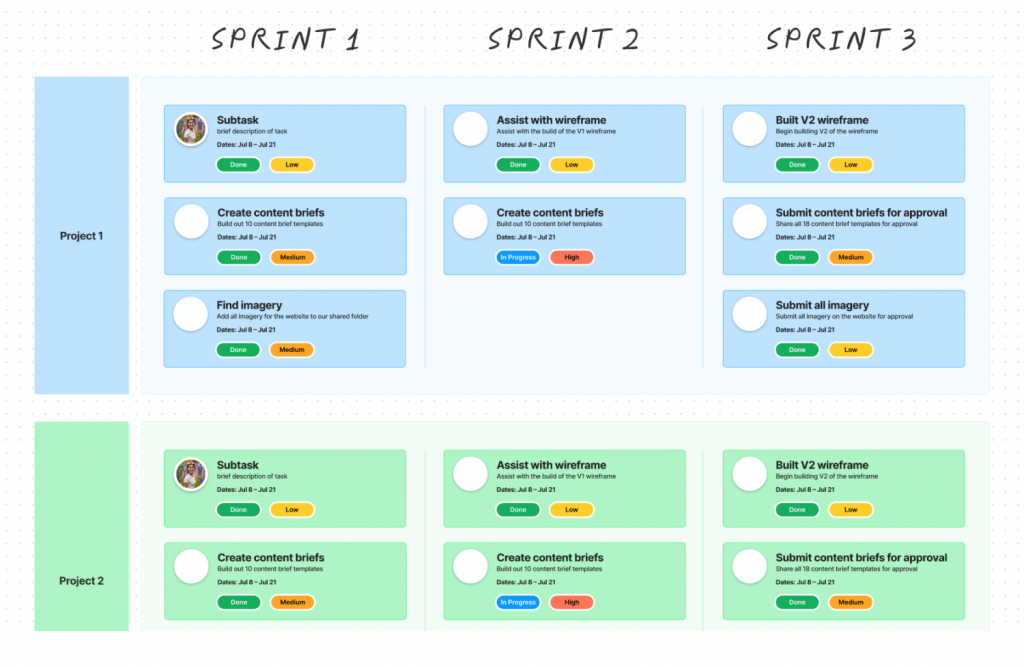
In my experience, monday.com excels at resource management, making it an indispensable tool for agile project management. Its visually appealing and customizable dashboards provide a clear overview of resource allocation, workload distribution, and project progress.
The platform’s flexibility allows you to tailor boards and workflows to match your specific needs, ensuring optimal use of your team’s capabilities. monday.com’s automation features reduce manual tasks, freeing up valuable time for more strategic activities.
Besides, the integration capabilities are also quite impressive. They seamlessly connect with other tools in your tech stack tech and ensure a smooth flow of information to keep all project data centralized.
What You Will Like:
- The intuitive drag-and-drop interface simplifies project management tasks, making it easy to organize and prioritize work.
- Robust automation features reduce manual work, saving time and effort and minimizing the risk of human error.
- Real-time collaboration and communication tools improve team coordination, ensuring everyone is aligned with project goals.
- Visual resource management dashboards provide clear insights into resource utilization, helping to optimize workload distribution.
- Comprehensive reporting and analytics help in making data-driven decisions, providing detailed insights into project performance.
What You May Not Like:
- The platform can become expensive as more features and users are added
- Limited offline capabilities can hinder work in areas with poor internet connectivity, affecting productivity.
Pricing: Starts at $9/seat/month. Billed annually.
3. QuickBase – Best for Tracking Performance Metrics
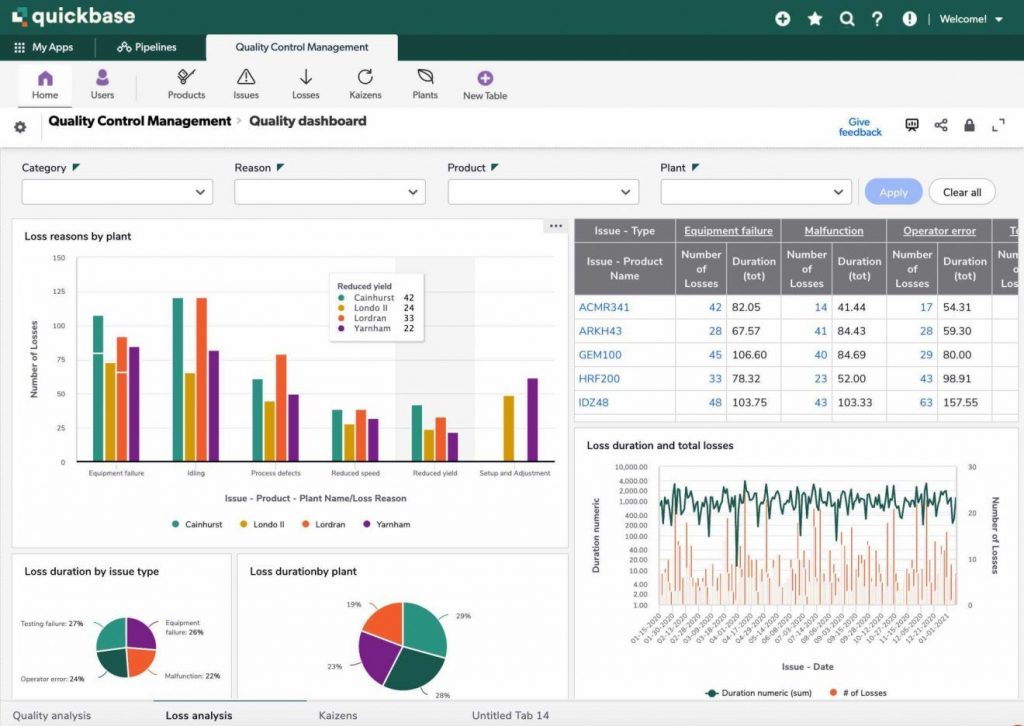
QuickBase is a powerhouse when it comes to tracking performance metrics in agile project management. My past experience with QuickBase has shown me how effectively it can transform raw data into actionable insights.
The platform’s customizable dashboards and reports provide a comprehensive view of key performance indicators (KPIs), enabling you to monitor progress, identify trends, and make data-driven decisions.
Also, its low-code environment allows you to build tailored applications that meet your specific needs, enhancing its versatility. The robust integration options ensure that all your project data is accessible in one place, streamlining the tracking process.
What You Will Like:
- Real-time data updates ensure that the latest information is always available, improving accuracy and decision-making.
- The platform’s powerful analytics and insights support informed decision-making, helping teams identify and promptly address issues.
- Flexible app-building capabilities allow users to create bespoke solutions that fit their unique project needs.
- The user-friendly interface ensures minimal training is required, allowing teams to become proficient quickly.
- Excellent customer support helps resolve issues quickly and efficiently, ensuring minimal disruption to project activities.
What You May Not Like:
- The mobile app has limited functionality compared to the desktop version, which may affect productivity on the go.
- Initial setup and customization can be time-consuming, requiring significant effort to tailor the platform to specific needs.
Pricing: Starts at $35/user/month for a minimum of 20 users. Billed annually.
4. Zoho Sprints – Best for Zoho Users
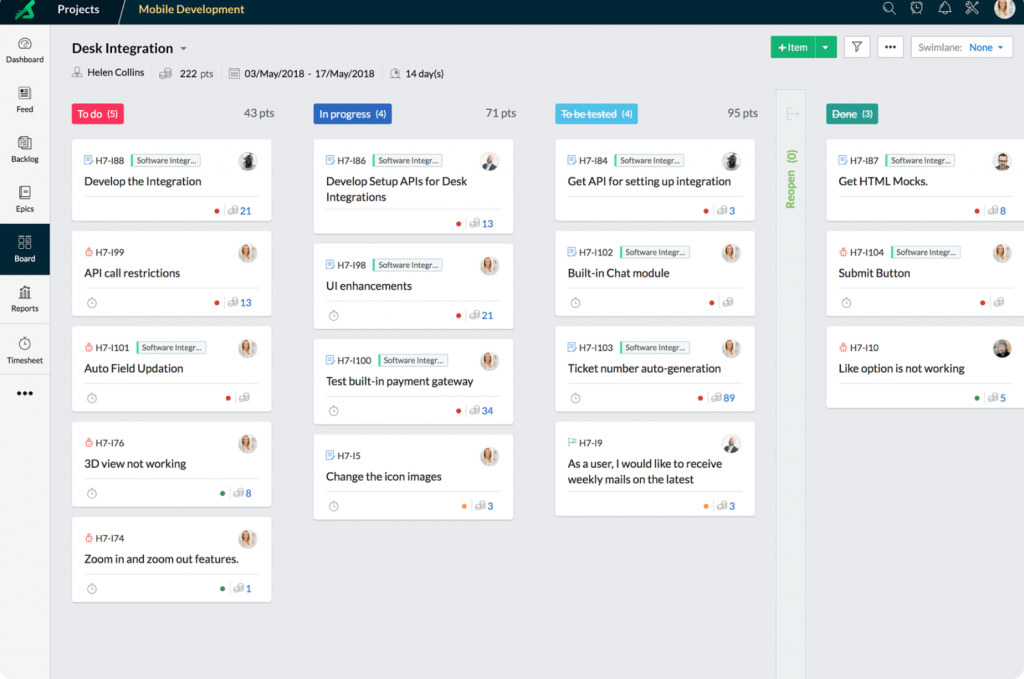
For those already embedded in the Zoho ecosystem, Zoho Sprints is a natural fit for agile project management. Having used Zoho Sprints, I appreciate how it integrates seamlessly with other Zoho products, creating a cohesive environment for managing projects.
The tool’s intuitive sprint planning features allow you to break down projects into manageable chunks and track progress easily. Zoho Sprints supports scrum boards, backlog management, and detailed analytics, making it ideal for teams adhering to agile methodologies.
The real-time collaboration features ensure that all team members are aligned and informed, promoting transparency and efficiency.
What You Will Like:
- Detailed time tracking allows teams to monitor productivity and manage workloads efficiently, ensuring optimal performance.
- Customizable workflows enable teams to tailor processes to their specific needs, improving efficiency and effectiveness.
- Affordable pricing makes it accessible for small teams and startups, providing robust features without breaking the bank.
- The Zoho Sprints mobile app allows you to access and manage your projects from anywhere.
- Connect with popular third-party tools like Slack, GitHub, Bitbucket, and more to enhance collaboration and streamline processes.
What You May Not Like:
- Non-Zoho users may face a learning curve when getting started, requiring additional time and effort to become proficient.
- Customization options may not be as extensive as other tools, limiting flexibility in certain use cases.
Pricing: Starts at $1/user/month. Billed annually.
5. Miro – Best for Ideation Sessions
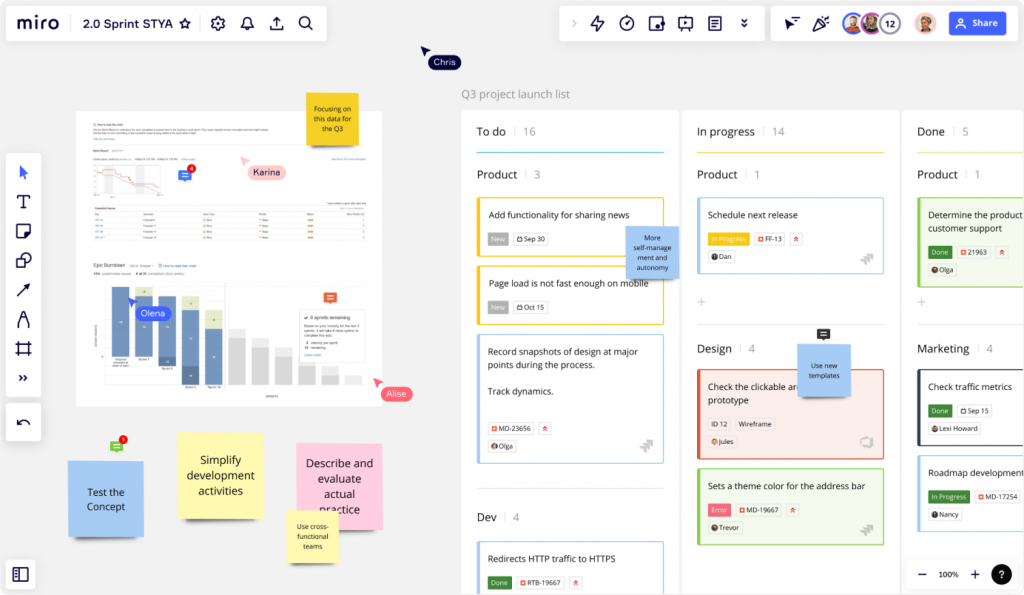
Miro has been a game-changer for ideation sessions in my Agile projects. Its online collaborative whiteboard platform fosters creativity and innovation, allowing team members to brainstorm, plan, and visualize ideas in real time.
The tool’s extensive range of templates and easy-to-use interface make it simple to start ideation sessions and keep them organized. Its integration with other project management tools ensures that ideas generated during sessions are seamlessly incorporated into the project workflow.
I love Miro’s ability to collaborate asynchronously or in real-time, which makes it an excellent choice for distributed teams.
What You Will Like:
- Real-time collaboration features allow for instant feedback and idea sharing, improving team communication and creativity.
- Integration with popular tools like Slack and Jira increases its versatility, making it easy to incorporate into existing workflows.
- Boards can be easily shared and exported, facilitating collaboration with both internal and external stakeholders.
- The platform supports a variety of use cases beyond traditional project management, including education and design.
- The user-friendly design requires minimal training, making it easy for teams to adopt and start using quickly.
What You May Not Like:
- Limited offline capabilities can be a drawback in areas with unstable internet connectivity, impacting productivity.
- Synchronization delays can sometimes disrupt the flow of collaborative sessions, leading to potential miscommunications.
Pricing: Starts at $8/member/month. Billed annually.
6. FigJam, by Figma – Best for Prototyping Sessions
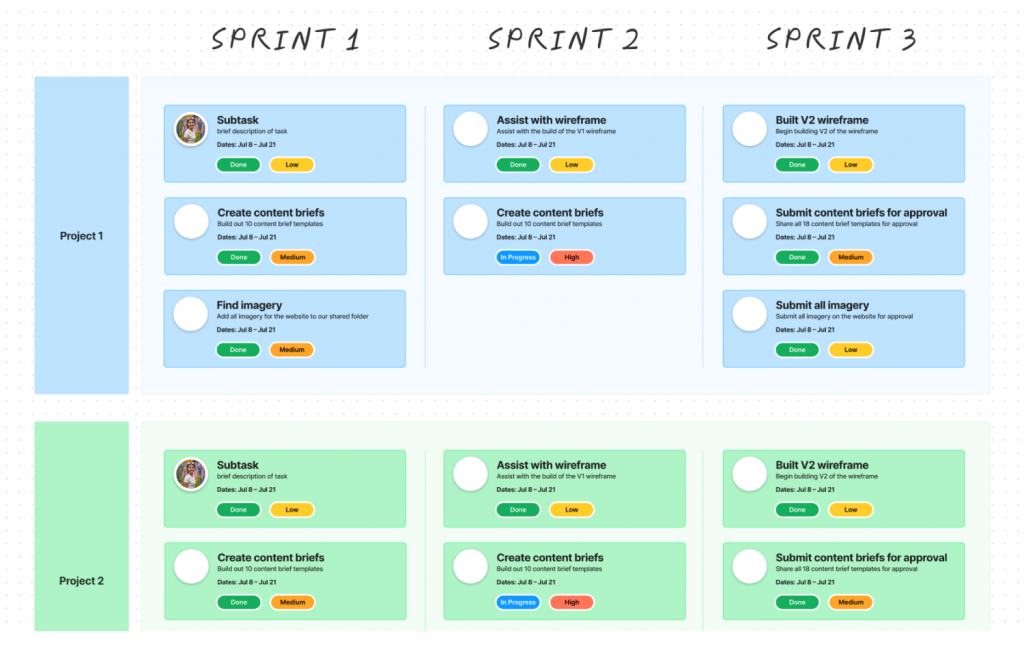
FigJam, by Figma, is another good agile project management software with its collaborative features, which make it ideal for designing and refining prototypes in an agile environment.
The platform allows team members to contribute ideas, provide feedback, and iterate on designs in real time, ensuring that everyone’s input is considered.
FigJam’s intuitive interface and extensive library of components simplify the prototyping process, making it accessible to both designers and non-designers. Its ability to create interactive prototypes and test user flows helps teams validate ideas quickly and effectively.
What You Will Like:
- Powerful prototyping tools facilitate the creation of detailed and interactive designs, enabling teams to visualize and test ideas effectively.
- Seamless integration with Figma and other design tools enhances workflow, making it easy to transition from design to prototype.
- An extensive library of design components supports rapid development, saving time and effort during the prototyping phase.
- The platform supports version control and history tracking, aiding in project management and ensuring that changes can be tracked and reverted if necessary.
- User-friendly design ensures quick adoption and minimal training requirements, allowing teams to focus on creativity rather than learning new tools.
What You May Not Like:
- The platform’s functionality is limited for non-design projects, reducing its versatility for teams with diverse project needs.
- A stable internet connection is required for optimal use, which can be restrictive for teams working in areas with unreliable connectivity.
Pricing: Starts at $12/month/seat. Billed annually.
7. Forecast– Best for Timeline Management
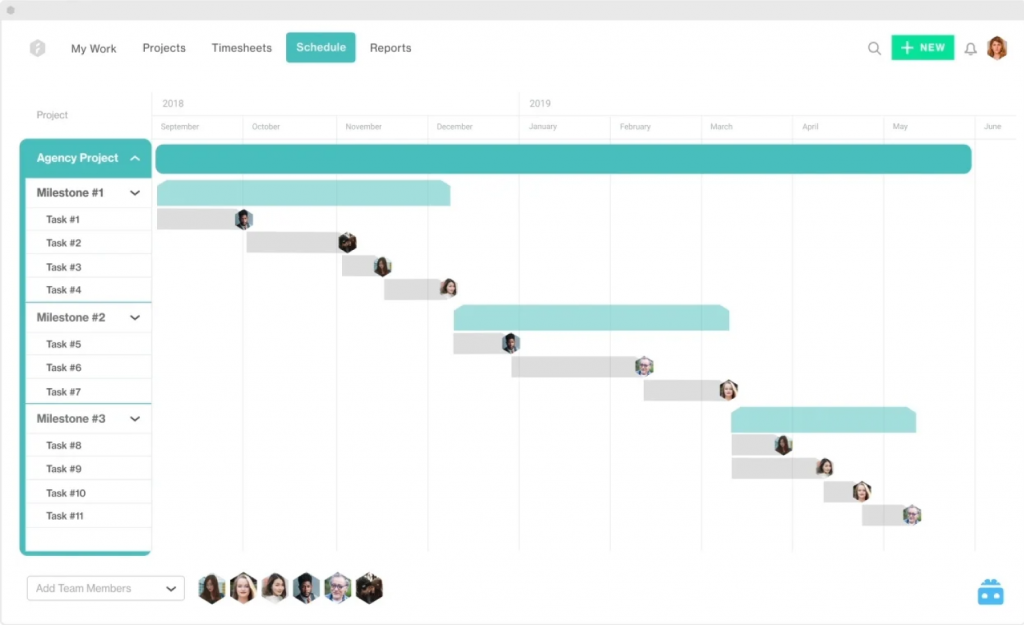
My industry colleagues have used Forecast, and this is considered an outstanding tool for timeline management, which is crucial for agile project management. They love how its AI-driven insights and predictive capabilities can significantly enhance project planning and execution.
The platform’s timeline view provides a clear visual representation of project milestones, deadlines, and dependencies, helping to identify potential bottlenecks and adjust plans accordingly.
Besides, its resource management features also ensure that team members are allocated efficiently, balancing workloads and maximizing productivity.
What You Will Like:
- The visual timeline and resource planning features provide clear oversight of project status, making it easier to track progress and allocate resources.
- Real-time project tracking helps teams stay on schedule and make timely adjustments, ensuring that projects are delivered on time.
- Detailed reporting and analytics support informed decision-making, providing valuable insights into project performance and resource utilization.
- The user-friendly interface ensures easy adoption and minimal training, allowing teams to start using the tool quickly and effectively.
- Customizable project templates allow teams to tailor the tool to their specific needs, improving efficiency and effectiveness.
What You May Not Like:
- The high cost can be prohibitive for smaller teams and startups, making it less accessible for budget-conscious users.
- AI predictions may occasionally be inaccurate, affecting project planning and requiring manual adjustments.
Pricing: Custom pricing.
8. Kintone– Best for Customizable Project Management
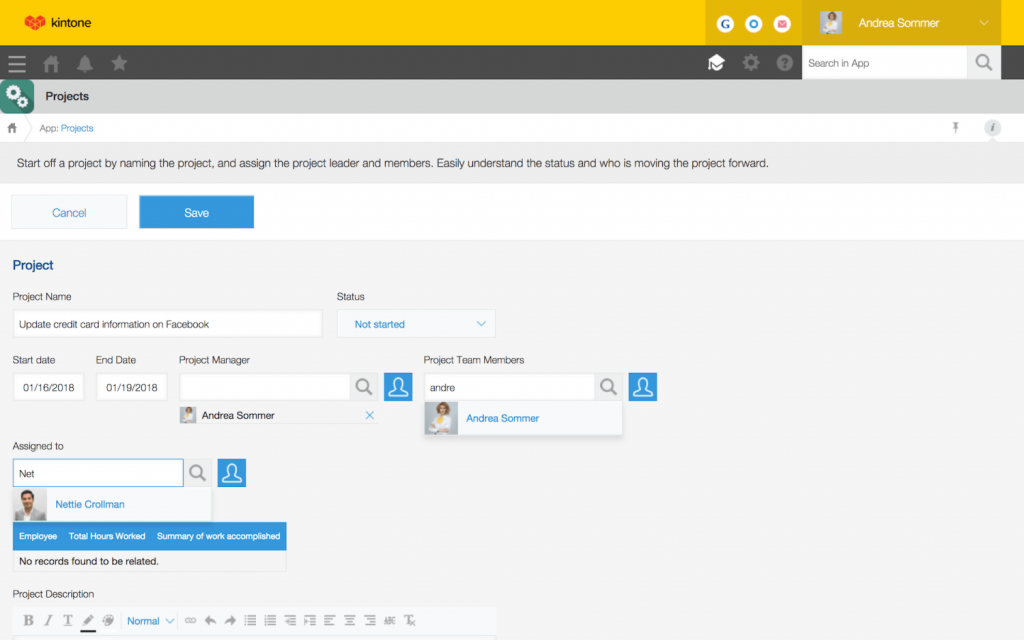
Kintone’s strength lies in its unparalleled customization capabilities, which I have personally experienced. The platform allows you to build custom workflows and applications without any coding, tailoring the project management process to your specific needs.
Kintone’s drag-and-drop interface makes it easy to create and modify workflows, ensuring that the tool evolves with your project requirements. The ability to integrate with various other tools and platforms further enhances its versatility.
It also has smart, collaborative features that ensure all team members are engaged and informed, promoting transparency and efficiency. For those seeking a highly customizable project management solution, Kintone is the best choice.
What You Will Like:
- The drag-and-drop interface simplifies app building and modification, making it easy to adapt workflows as project requirements change.
- Real-time collaboration tools enhance team communication and coordination, ensuring that everyone is aligned with project goals.
- Detailed reporting and analytics provide valuable insights into project performance, helping teams identify and promptly address issues.
- The user-friendly interface requires minimal training, facilitating quick adoption and effective tool use.
- Excellent customer support ensures that any issues are resolved promptly, minimizing disruption to project activities.
What You May Not Like:
- Performance issues may occur with large datasets, impacting the overall user experience and efficiency.
- The initial setup and customization process can be time-consuming, requiring significant effort to tailor the platform to specific needs.
Pricing: Starts at $24/user/month for a minimum of 5 users. Billed annually.
9. Trello– Best for Workflow Automation
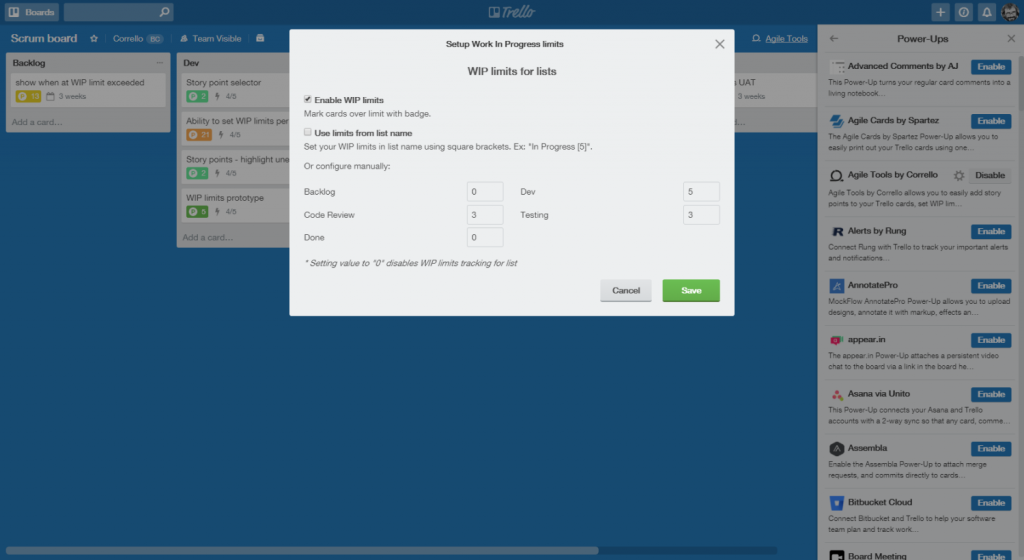
Trello has proven to be incredibly effective for workflow automation in my agile projects. I really like its card-and-board system that provides a simple yet powerful way to visualize and manage tasks, making it easy to manage projects.
Trello’s automation features, which are powered by Butler, allow you to create rules, buttons, and commands that streamline repetitive tasks, saving time and reducing errors.
The platform is also quite flexible, and its ease of use makes it accessible to all team members. This ensures that everyone can contribute to the workflow so that you can derive better productivity.
What You Will Like:
- The intuitive and visual interface makes project management easy and engaging, helping teams stay organized and focused.
- The flexible board customization allows teams to tailor their workflows to their needs, improving efficiency and project outcomes.
- Real-time collaboration and updates keep team members informed and aligned, improving communication and coordination.
- Boards can be easily shared and exported, facilitating collaboration with both internal and external stakeholders.
- Affordable pricing makes it accessible for small teams and startups, providing robust features without breaking the bank.
What You May Not Like:
- Limited advanced project management features may not meet the needs of larger teams.
- Boards can become cluttered with too many cards, reducing efficiency and making it difficult to find specific tasks.
Pricing: Starts at $5/user/month. Billed annually.
10. ProjectManager.com – Best for Agile Project Management
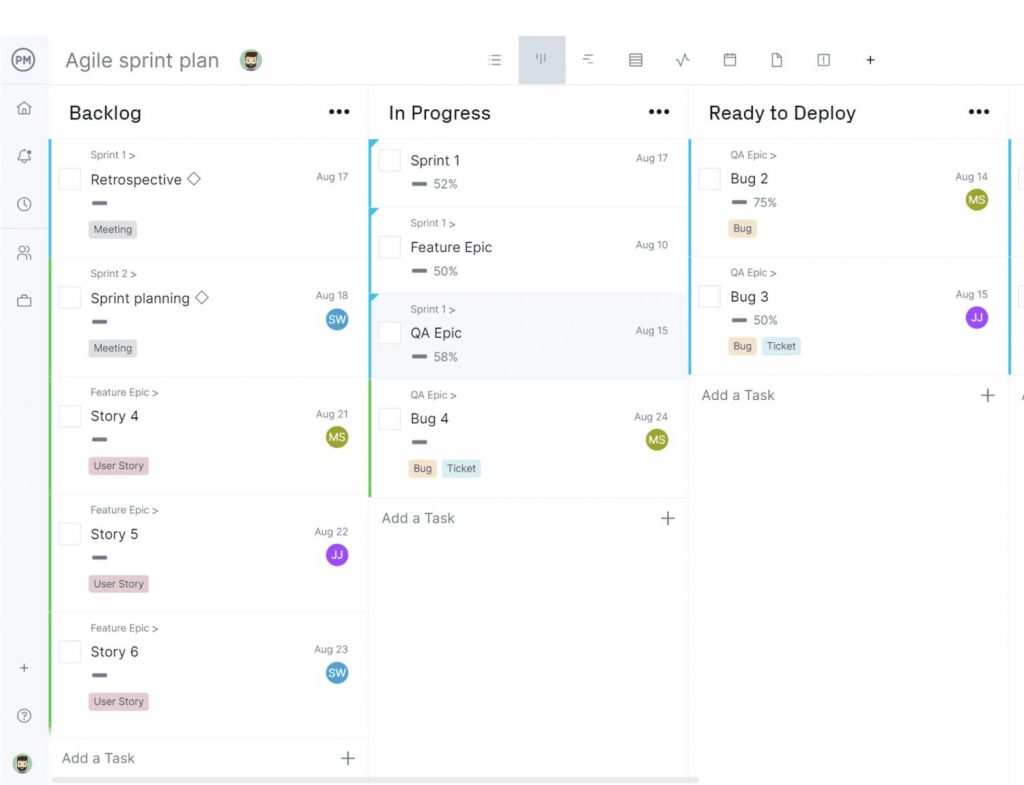
ProjectManager.com excels in Agile Project Management and provides a comprehensive view of resource availability, allocation, and workload, ensuring that team members are utilized effectively.
I have used this extensively in the past. Its Gantt charts and calendar views allow for precise scheduling and tracking of tasks, helping to avoid conflicts and overbooking.
It also has real-time data and reporting features that provide valuable insights into resource usage and project progress, enabling informed decision-making. Plus, the seamless integration with popular tools like Microsoft Office enhances its functionality, making it easy to connect with existing tools and workflows.
What You Will Like:
- Real-time tracking and reporting help teams stay informed and make timely decisions, ensuring that projects stay on schedule.
- It allows you to maintain the version history of documents to track changes and updates.
- Customizable project templates allow teams to tailor the tool to their specific needs, improving efficiency and effectiveness.
- Ensure data privacy and security with robust encryption support.
- You can track time spent on tasks and projects and integrate it with payroll systems.
What You May Not Like:
- The mobile app lacks some features available on the desktop version, limiting on-the-go project management capabilities.
- Some users report that the platform can be slow, particularly with large projects and data sets.
Pricing: Starts at $13/user/month. Billed annually.
Streamline Agile Practices with Top Project Management Software
After using a lot of agile project management software, I think the right tool can significantly enhance your team’s productivity and collaboration. They provide a range of features tailored to meet diverse project needs, ensuring efficient workflows and successful project outcomes.
If I had to pick an option from the list above, I would choose the ProProfs Project for its intuitive interface, robust task management, time tracking, and seamless collaboration features. Its comprehensive reporting tools and integration capabilities also make it an excellent option for agile project management, enabling teams to stay organized and on track effortlessly.
Learn More About Agile Project Management Tools
What are the benefits of agile project management tools?
Agile project management tools offer benefits such as increased flexibility, improved collaboration, and faster delivery times. These tools support iterative processes, allowing teams to adapt quickly to changes and feedback. They facilitate real-time communication and transparency, enhancing team alignment and accountability. Agile tools also help better track progress and identify issues early, which can lead to higher-quality outputs and more satisfied stakeholders.
Read More: 6 Reasons to Opt for Agile Methodology for Mobile App Development
What is an agile methodology?
Agile methodology is an iterative approach to project management and software development that focuses on continuous improvement, flexibility, and collaboration. It breaks projects into small, manageable increments called sprints or iterations, allowing teams to deliver parts of the project incrementally. This approach emphasizes adaptability to changing requirements, close communication with stakeholders, and frequent reassessment of project goals and progress to ensure the project meets the desired outcomes effectively.
How is agile useful for software development teams?
Agile is particularly useful for software development teams because it promotes flexibility, continuous feedback, and incremental progress. Teams can quickly respond to changes in requirements and user feedback, ensuring the final product aligns with user needs. Agile encourages frequent releases of functional software, enhancing the ability to detect and fix issues early. It also fosters collaboration among team members and stakeholders, leading to improved innovation and problem-solving.
Read More: Agile vs Waterfall Methodology: Comparison, Pros & Cons.
Is there free agile PM software?
Yes, there are several free agile project management (PM) software options available. Tools like ProProfs Project, Trello, Asana (basic version), and Jira (free tier) offer essential agile features such as task boards, sprints, and backlog management. These free versions are suitable for small teams or individual projects, providing the fundamental tools needed to implement agile methodologies without incurring costs. However, advanced features may require a paid Subscription
FREE. All Features. FOREVER!
Try our Forever FREE account with all premium features!





